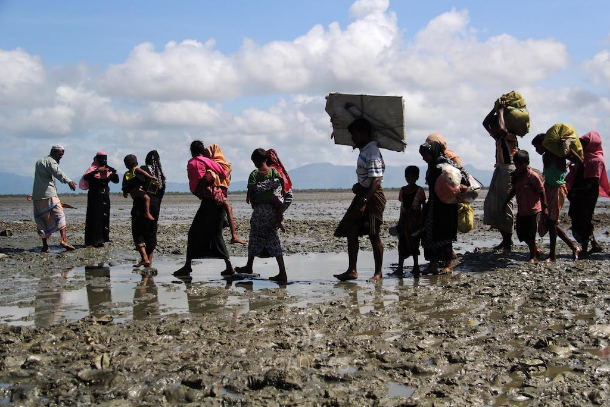Hasina also claims aid workers fear they will lose their jobs if repatriation goes ahead

Bangladeshi PM Sheikh Hasina said a delay in repatriation should be blamed on Myanmar and aid groups.
Stephan Uttom and Rock Ronald Rozario, Dhaka, Bangladesh
June 11, 2019
Bangladesh’s Prime Minister Sheikh Hasina has blamed Myanmar and aid agencies for the delay over repatriation of Rohingya refugees.
“The problem that I now see is that different international agencies that are providing voluntary services or working here [in Cox’s Bazar] never want any refugees to go back. The problem lies here,” Hasina said during a press conference in Dhaka, United News of Bangladesh reported on June 9.
Many officials in aid agencies fear that they will lose their jobs if Rohingya are repatriated to Myanmar, she alleged.
Hasina blamed aid groups for instigating Rohingya protests during the government’s attempt to repatriate the first batch of refugees in November last year.
She also criticized aid agencies for opposing a plan to relocate thousands of Rohingya to an island in the Bay of Bengal.
Hasina said Myanmar has not created a conducive environment for Rohingya to return to Rakhine State. “Myanmar also doesn’t want to take them back, which is another major barrier to their repatriation. The problem lies with Myanmar [as well],” she said.
This is the first time Hasina has strongly criticized Myanmar and aid agencies since the mass exodus of hundreds of thousands of Rohingya from Rakhine in 2016 and 2017 to flee deadly military and radical Buddhist atrocities.
Most aid groups active in refugee camps are positive about Rohingya repatriation, according to James Gomes, regional director of Catholic charity Caritas Chittagong.
“Rohingya are a priority issue, so when the PM says something, that is likely to be based on reports. I believe those aid groups and officials opposing a Rohingya return for their own interests are few in number,” Gomes told ucanews.com.
The government should take action if it has “proven evidence” of aid groups and officials pushing back against a Rohingya return, an aid worker based in Cox’s Bazar told ucanews.com.
Repression and death
Bangladesh says more than one million Rohingya Muslims from Myanmar reside in camps in Cox’s Bazar district. According to the United Nations refugee agency UNHCR, more than 723,000 Rohingya have entered Bangladesh since August 2017.
Rohingya refugees say their opposition to “hasty repatriation” and “risky relocation” is voluntary and not instigated by aid groups.
“No Rohingya is happy to live in a foreign land as refugees, but they don’t want to put their lives at risk of repression and death,” Muhammad Hashem, 37, a father of three from Balukhali refugee camp, told ucanews.com.
“Here, the government and aid groups have supported us to have a safe and peaceful life. If we have a guarantee of the same conditions in Myanmar, we will go back straight away.”
Bangladesh and Myanmar signed a deal to repatriate Rohingya refugees to Myanmar on January 2018. Rohingya refugees in Bangladeshi camps, international communities including aid groups and rights watchdogs criticized the plan for not addressing key issues including a guarantee of safety and citizenship, reparations and return of property.
On Nov. 15, 2018, thousands of Rohingya took to the streets near refugee camps in Cox’s Bazar as Bangladesh made efforts to repatriate the first batch of refugees to Myanmar.
Refugees said the situation in Rakhine was “inconvenient and unsafe” for their return, while their demands for citizenship and an end to persecution were missing in the deal.
Refugees, aid groups and rights bodies have also been opposing Bangladesh’s plan to relocate about 100,000 Rohingya to a flood-prone and uninhabited island in the Bay of Bengal.
Bangladesh’s change of tone on Myanmar and aid groups is seen as a gradual shift in Rohingya policy after an apparent failure to solve the crisis bilaterally with Myanmar.
Bangladesh has recently been engaging diplomatically with various Muslim countries to unite for the Rohingya cause.
Bangladesh has also been cooperating with the International Criminal Court over a preliminary investigation to start a formal war crimes case against Myanmar over atrocities against Rohingya.
